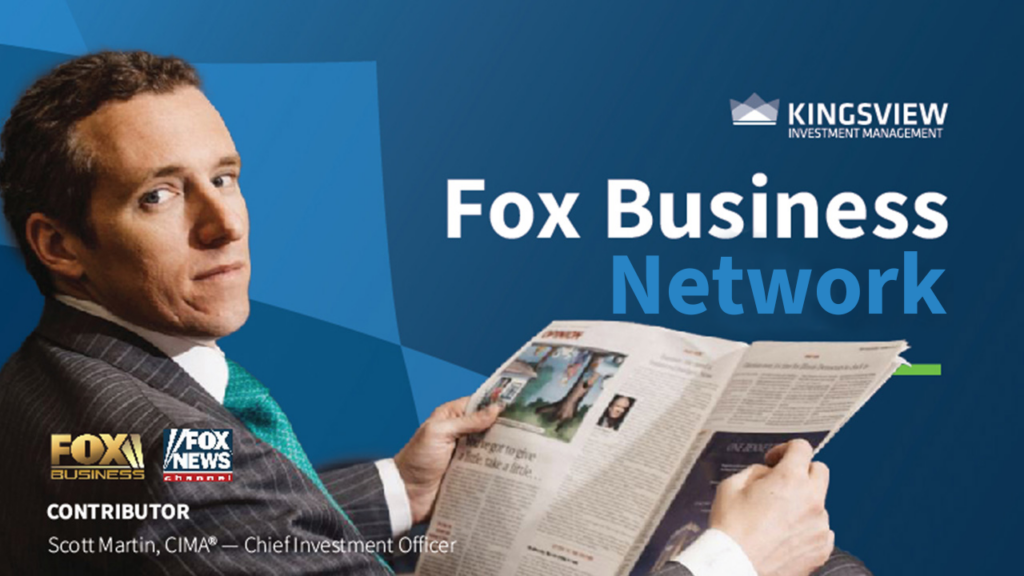Kingsview CIO Scott Martin On Fox Business News – Cavuto Coast to Coast 8.27.24

Click here to listen to the full interview.
NEIL CAVUTO: We’ve got Scott Martin here from Kingsview Asset Management and Ray Wong, CEO of Constellation Research. Ray, we’ll start with you. There’s a lot going on today, especially with Mark Zuckerberg’s comments. I’m not sure why he chose today to acknowledge that the Biden White House was pressuring him on how COVID cures and treatments were presented. It’s been four years, and now, with the Telegram CEO’s arrest in France, there’s a lot to unpack here. What do you make of it?
RAY WONG: Yeah, social media platforms are under attack. They’re grappling with maintaining a balance under Section 230, where they’re not responsible for user content, yet they need to police that content. They’re trying to find that middle ground, especially in an election year with increased scrutiny. As you know, almost 53% of the world’s population is in the midst of an election this year, leading to significant scrutiny over these platforms. The challenge is fighting misinformation and disinformation in a neutral, third-party manner. Unfortunately, no company or startup is currently serving as a clearinghouse for content, ensuring it comes from a credible source, even if the content itself isn’t accurate. That solution doesn’t exist today.
NEIL CAVUTO: And bias is often in the eye of the beholder, right? Scott, I was listening to some conservatives who are angry at Zuckerberg, calling him a big liberal who didn’t speak up when he had the chance four years ago. Meanwhile, liberals argue that their voices aren’t being heard, and they’re upset about crackdowns on platforms like Google. So, it seems everyone feels slighted in some way, but all of this is under the microscope now, isn’t it?
SCOTT MARTIN: It is, and it’s low-hanging fruit, Neil. We’ve seen CEOs from social media companies like Meta, Google, Apple, and Microsoft testify before Congress, where there’s a lot of back-and-forth with lawmakers saying, “You guys are liberals too, right? Let’s work together.” But in the end, nothing changes. Governments see these companies making billions of dollars in profits each quarter, and they think these companies can afford to make improvements. While that’s true, Ray makes a good point—what level of responsibility do these companies have? Governments often change their stance on what they want altered on these platforms, so the companies keep doing what they do. They’re capitalist corporations that focus on making profits, and they do that very well. Governments are behind on these issues, and when they try to catch up, as we’ve seen with the Telegram situation, they often react drastically, causing significant upheaval. That’s what we saw with Zuckerberg’s comments today.
NEIL CAVUTO: It’s interesting, Ray. During the break, you and I talked about the high expectations ahead of NVIDIA’s earnings, which are expected after the bell tomorrow. It seems like issues like this—regulation and scrutiny over what tech companies can and cannot do—are becoming a bigger concern for the industry than even the success of a chip maker like NVIDIA. How do you see it?
RAY WONG: The challenge is that we’re down to a few companies that can play in this space. Whether it’s social media or AI, only billion-dollar companies can compete because it requires immense resources. We’re also seeing these companies becoming oligopolies, and whether they’ll be well-managed is uncertain. They’ve certainly been politicized, and that’s a major challenge.
NEIL CAVUTO: What do you make of the attention on NVIDIA right now? It’s a company with lofty expectations on earnings, and it usually exceeds them, but there’s extra pressure this time. I feel like this goes beyond just NVIDIA—it has significant implications for the entire tech industry, even beyond the “Magnificent Seven.” How do you approach that?
SCOTT MARTIN: It does, Neil, and there’s a lot of hype surrounding it. If NVIDIA does well, it’s likely other tech companies will too because it reflects broader spending and future outlooks. But it reminds me of 1999 when we were relying on companies like AOL and Lucent to deliver strong earnings, which had a big impact on the market. A lot of NVIDIA’s success is already priced into the stock. We own it, and we’ve seen it rise significantly, so we’re happy to hold it. However, if things change drastically, which I don’t foresee at the moment, it could affect the market in the short term, but NVIDIA will remain crucial for AI development moving forward.
NEIL CAVUTO: Another big issue is the upcoming Apple event on September 9th. They’re expected to launch the iPhone 16, and there are high expectations, right?
RAY WONG: Yes, we’re in the midst of a supercycle. We had a 5G supercycle, and now we’re entering the AI supercycle, with 230 to 240 million iPhones about to be AI-enabled.
NEIL CAVUTO: By the way, have you noticed if 5G has made your phone or devices faster?
RAY WONG: No, I haven’t noticed that at all.
NEIL CAVUTO: I’m serious. I thought I’d see a big difference, but I haven’t.
SCOTT MARTIN: Yeah, more calls have dropped for me since I switched to 5G.
NEIL CAVUTO: Right, before you even search something, it was supposed to already have the answer for you.
RAY WONG: And I can’t even pair my phone properly anymore. It drops the connection even during pairing.
NEIL CAVUTO: So Scott, 5G didn’t live up to the hype for you, at least?
SCOTT MARTIN: No, and I’m glad we’re not on 5G here, or we’d probably have lost the connection by now. And Neil, speaking of AI and Apple, can they please improve Siri? Siri and I have been together, as the kids say, for the last five to ten years, and she still doesn’t know me. She doesn’t know what I like, and I have to explain it to her every time. That’s something they need to work on as this new supercycle begins.
NEIL CAVUTO: Well, there’s competition out there with Alexa and others. It’s a crazy market. Scott, Ray, you guys are the best. Thanks so much.


